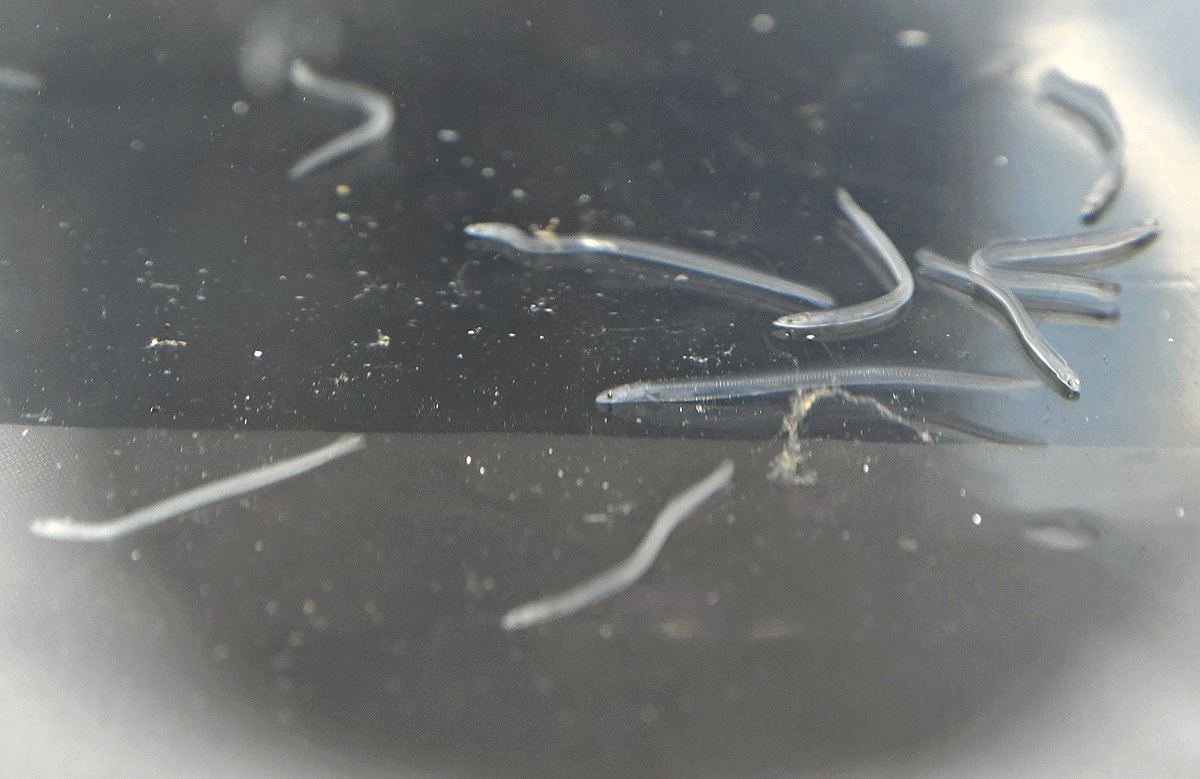Project to Mass Produce Japanese Glass Eels Succeeds in Reducing Costs; Pilot Scheme Brings Down Costs to ¥1,800 Per Fish

Artificially grown glass eels are seen in Chiyoda Ward, Tokyo, on July 4.
20:00 JST, July 13, 2024
A project to farm glass eels at scale could reduce production costs to ¥1,800 per fish, the Japan Fisheries Research and Education Agency said.
The agency announced July 4 the results of the pilot project aimed at producing the juvenile Japanese eels, shedding light on the commercialization of the popular delicacy. According to the agency, the cost reduction was realized by the development of new feed and tanks among other reasons.
The cost remains about three times the trading price of wild eels, but the Fisheries Agency, which commissioned the project, said, “The results have paved a path for the commercialization of Japanese eels.”
Juvenile eels needed for farming mostly come from nature, but little is known about their ecology. The domestic catch of young eels in recent years has stagnated at around 10 tons.
In 2010, the agency’s predecessor successfully raised eels from collected eggs and had them spawn eggs for another generation. However, raising glass eels from eggs had long been considered difficult.
According to the recent announcement, the agency has developed technology to increase the number of eels that are healthy after they hatch, and has succeeded in promoting their growth by using new feed that contains chicken egg. The researchers also developed a large aquarium tank and an automatic feeding system to improve production efficiency.
As a result of these efforts, the production cost per glass eel fell to ¥1,821, from more than ¥40,000 in fiscal 2016. In comparison, the trading price of a wild glass eel normally ranges between ¥500 and ¥600. The Fisheries Agency aims to eventually reduce the cost to less than ¥1,000 by providing mass-production technology to local governments and private companies in a bid to expand the scale of production.
Top Articles in Science & Nature
-

Japan Institute to Use Domestic Commercial Optical Lattice Clock to Set Japan Standard Time
-

Japan to Face Shortfall of 3.39 Million Workers in AI, Robotics in 2040; Clerical Workers Seen to Be in Surplus
-

Record 700 Startups to Gather at SusHi Tech Tokyo in April; Event Will Center on Themes Like Artificial Intelligence and Robotics
-

iPS Treatments Pass Key Milestone, but Broader Applications Far from Guaranteed
-

iPS Cell Products for Parkinson’s, Heart Disease OK’d for Commercialization by Japan Health Ministry Panel
JN ACCESS RANKING
-

Japan PM Takaichi’s Cabinet Resigns en Masse
-

Japan Institute to Use Domestic Commercial Optical Lattice Clock to Set Japan Standard Time
-

Israeli Ambassador to Japan Speaks about Japan’s Role in the Reconstruction of Gaza
-

Man Infected with Measles Reportedly Dined at Restaurant in Tokyo Station
-

Videos Plagiarized, Reposted with False Subtitles Claiming ‘Ryukyu Belongs to China’; Anti-China False Information Also Posted in Japan






















